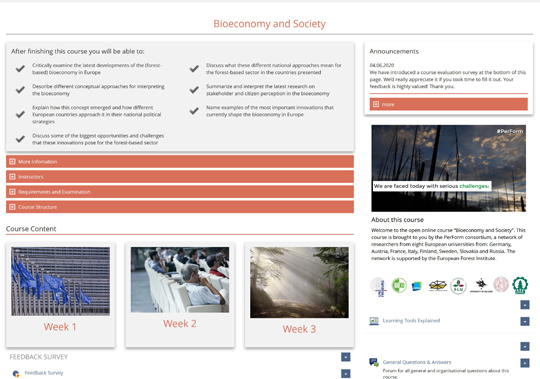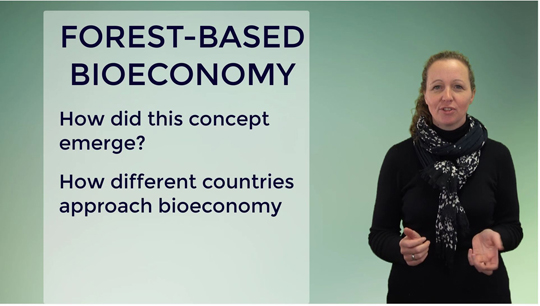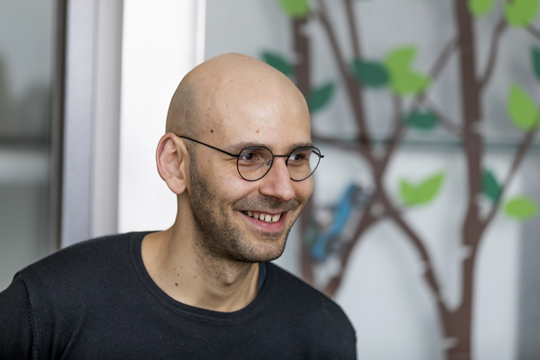E-Learning Equalizes Access to Knowledge
Freiburg, Aug 18, 2020
Foresters and forest science specialists aren't really known for sitting indoors. Yet it's highly likely that Dr. Alex Giurca spent quite a bit of time sitting at his computer from 18 May until 12 June 2020. The research assistant at the Chair of Forest and Environmental Policy of the University of Freiburg was one of the organizers of a Massive Open Online Course (MOOC) called "Bioeconomy and Society." The online seminar was not one those forced onto the Internet by the coronavirus. It developed from the two-year project known as "Perform," which is supported by the European Forest Institute Network Fund. Annette Hoffmann spoke with Alex Giurca about his experiences with E-Learning, learning curves, and time zones.
 The ILIAS learning platform of the University of Freiburg allows for the implementation of flexible learning formats. Source: ILIAS, University of Freiburg
The ILIAS learning platform of the University of Freiburg allows for the implementation of flexible learning formats. Source: ILIAS, University of Freiburg
Mr. Giurca, did you wonder about the composition of the group taking the "Bioeconomy and Society" MOOC? Sixty-seven percent of the 70 participants were women and only 35 percent of the group was between 20 and 29 years old, and therefore presumably university students.
Alex Giurca: Many viewed the course as continuing education. We had people taking part who worked for the US Department of Agriculture or for the European Union (EU) in Brussels, Belgium, and who wanted to learn about the latest in the field of bioeconomy. I'd expected that other people besides students would register. Bioeconomy is a very political topic and important for the general public as well.
In what framework did the MOOC take place? It was held in cooperation with several European universities.
It was based on the Perform network, in which eight forestry seminars of our partner universities are represented. The online course was a result of this project, which dealt with the social aspects of bioeconomy. So many scientific publications are produced within this framework that never reach society in general. We wanted to make this knowledge accessible to everyone. We would like to now expand our experiences within the EPICUR consortium, in which the University of Freiburg and seven other partner universities are supported as the European University, with two seminars – one on Integrated Land Use Systems and another on International Forest Government.
 Daniela Kleinschmit, Professor for Forest and Environmental Policy at the University of Freiburg, worked as an instructor with others to set up the Massive Open Online Course (MOOC) called "Bioeconomy and Society." Source: ILIAS, University of Freiburg
Daniela Kleinschmit, Professor for Forest and Environmental Policy at the University of Freiburg, worked as an instructor with others to set up the Massive Open Online Course (MOOC) called "Bioeconomy and Society." Source: ILIAS, University of Freiburg
Doesn't a great amount of effort go into seminars like these?
In our department we have a small, simple studio with a camcorder, a few spotlights, a microphone and a green screen. Whenever I was at conferences in conjunction with the project, I interviewed lecturers and recorded our talks. But the learning curve for editing the videos and presenting them attractively was quite steep. We were well-prepared and had a great deal of support from IT Services (RZ). I supplied Marko Glaubitz from the E-Learning Department with content and he created an interface with the ILIAS learning platform. I was impressed with the potential that it has. It works, and looks good, too. The video presentations are between five and fifteen minutes long. We spoke with economists and political scientists from very different schools of thought. Before the corona pandemic I travelled a great deal. I was in Sweden and Belgium, but I also filmed lectures in Freiburg as well. That all had to be well-coordinated. We had to stick to the storyline and agree on the pieces, so that it didn't become redundant. And then there were expert interviews for which we sought people who were internationally active and could contribute practical elements. The participants found the interviews very valuable because they were done with people who deal with the topic daily.
And part of your job was then to function as presenter and host?
Yes. In addition to giving two lectures, I was the one responsible for answering questions. The people who took part in our course came from twenty countries located in a range of time zones. At the beginning, we were still thinking about offering webinars and live discussion. But 70 participants were too many for that format and the time differences were also problematic. Presenting was a full-time job. It took me a good five hours each day to answer all the questions and stay in contact with everyone.
Normally, that's the purpose of classroom sessions.
Of course, but for a two-hour teaching sessions I still have to spend two or three hours preparing slides and then there are questions and further sessions. At the end of the day, the effort is the same. The advantage of the MOOC is its flexibility. I learned a great deal during these weeks, and not just about E-Learning, but also a lot from the participants as well. I'm still reading books and essays that they recommended.
 "Crises generate creativity," says Alex Giurca – and he is certain that digital instruction will be one of the success stories of the time of the corona pandemic. Photo: Jürgen Gocke
"Crises generate creativity," says Alex Giurca – and he is certain that digital instruction will be one of the success stories of the time of the corona pandemic. Photo: Jürgen Gocke
Will E-Learning replace the classic classroom lecture format?
No. E-Learning will be one element in a set of tools. We will implement "Blended Learning" in EPICUR. The first two weeks of both our courses are organized digitally. Then, in the third week they'll move to the classroom. We're doing it that way so as many people as possible can take part. That also has something to do with the democratization of knowledge. Then everyone will be at the same level. The model for learning would then no longer be the classical "top-down" one, but an open debate. My role is that of the presenter and host, who brings the people together and sees who has what information, and how this can be shared and discussed so that everyone benefits.
Do you think the corona pandemic will change teaching in a lasting way?
In any case, yes. Crises generate creativity. When we started with E-Learning last year, I had to convince the professors that it was important to record their lectures. Now I'm surprised at how quickly people have mastered the transition. There were so many creative concepts. I hope this dynamic continues. I also hope that teaching will soon be taking place in seminar rooms again. What we should take from this for the future is flexibility, above all. Until recently, an absurd position was still being maintained that four hours at the computer could replace four hours in a classroom setting. It would be as if the students would watch three Hollywood movies in one day. Many instructors are now considering how learning objectives can better be formulated and how we can more clearly impart knowledge. This has a great deal to do with confidence in the students' readiness to learn. It is enough to provide ten minutes of stimulation, then we can subsequently chat about it in forums, recommend additional essays, and discuss things. I am certain that digital teaching will be one of the success stories from this period.

